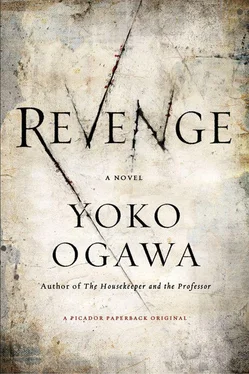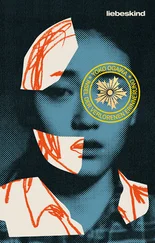On such evenings, my uncle generally did most of the talking. My father did not drink and was, by nature, somewhat taciturn. My uncle would talk about new business prospects or some strange adventure from his travels, or he would gossip about the family. As he spoke, his voice and gestures were almost theatrical, and he would laugh merrily at his own stories. From time to time he would feed me some tidbit that had been served with his sake. My father said little and asked no questions, content to look on with a bemused smile, while my mother simply shuffled back and forth to the kitchen.
Eventually my father would make some excuse about an early start in the morning and leave us. I was told to put on my pajamas, and my mother would begin to clear away the dishes—but my uncle would linger on at the table.
And if I got up in the night to go to the bathroom, he would still be sitting there—with his whiskey, slumped over the table and mumbling incomprehensibly. But from time to time he would sit up and laugh to himself, the same laugh we’d heard all through dinner.
* * *
During the day, he would loaf about the house. Whenever my mother asked him to help with some chore that required physical strength, he would respond enthusiastically, although she would rarely ask him to do more than carrying a box of my father’s books to the second floor or opening the sticky lid of a jar. Clearly, she did not consider him very useful.
When he got bored, he would wander over to my room.
“Well then, shall we build that model?” he once proposed.
The model in question was one my father had bought me for my birthday. He and I were planning to build it the following Sunday. I was suddenly filled with anxiety; not so much over breaking the promise to my father, but because I just knew my uncle would ruin the model. He seemed completely unaware of my feelings as he tore open the box and spilled out the parts.
“Let me help,” I urged.
“No, this is pretty tricky. A bit much for a kid. You’d better let me do it.” I was not permitted to touch the propellers or the wings or even the tube of glue.
The instructions were printed in a tiny typeface, and he was constantly adjusting his glasses or moving the lamp as he worked. He spread out the pieces on the desk and fitted them together, then pulled them apart again. He would put them together another way—and then start over with a different set of pieces, muttering the whole time about how confusing it was.
“Is everything all right?” I asked, overcome with nerves.
“Be patient,” he said, nodding. “It’s going to be fantastic.” A bead of sweat dangled from the end of his nose.
Unable to stand it anymore, I went outside to play. When dinnertime came, he was still working on the model—which bore only the vaguest resemblance to an airplane.
“It’s all right if you don’t finish it,” I said, trying to be as diplomatic as I could. Unfortunately, he was not about to give up. It was sometime the next morning before he was done.
“There,” he said, coming to find me with the plane in his hands. “What do you think?”
“It’s great,” I said. It looked nothing like the photograph on the box, but I was reluctant to disappoint him. Traces of glue clung to his fingers.
The plane was oddly out of kilter, as though none of the pieces were in quite the right place. The cockpit had gaps, the wheels were askew, and, worst of all, the wings had been attached at crooked angles.
My uncle left after lunch that day. Later, as I was setting the model on top of my bookshelf, the right wing fell off. I let out a little cry and the propeller dropped to the floor, followed by one of the wheels, and finally the left wing, which came to rest at my feet.
* * *
One day my uncle appeared with an odd-looking object. It resembled a dog’s collar that had been attached to the end of a long, narrow metal plate. At the other end was a wide belt.
“This is a brace to make you grow,” he said. My parents looked skeptical but said nothing. “Let me show you how it works.”
I was chosen to be the guinea pig.
“Does it hurt?” I asked, somewhat alarmed, but my uncle just shook his head and started loosening the buckles.
“Not a bit,” he said. “You’d like to be taller, wouldn’t you? Short guys never get the girls—which is why men all over the world are going to be clamoring for these.”
The belt that looked like a collar turned out to be exactly that. My uncle buckled it tightly around my throat. The metal plate pressed against my spine, held in place by the belt around my waist.
“How does that feel?” He spread his arms and studied me with obvious satisfaction, but there was a concerned look on my mother’s face. And, indeed, I was finding it hard to breathe; my neck was being forced up, and I couldn’t turn my head to the side or bend at the waist. I was completely immobilized, with only my eyeballs free to move.
“Just thirty minutes a day for six months and you’ll be two inches taller. It stabilizes the neck and pelvis and stretches the muscles, which provides stimulation for the bones and encourages secretion of the growth hormone.”
“Thirty minutes?” I said, nearly in tears.
“And you’ll be taller. What more could you ask?”
“But it hurts,” I said. “I can’t breathe.”
“You can’t?” he said, fiddling with the buckle. “I guess I’ve got it too tight. This is just a prototype; I’m still working out the details. But I’ve decided to go into the mail-order business with these, I’m completely convinced they’ll sell. I’ve signed a contract with a factory to produce them, and I’m going to advertise in all the newspapers and men’s magazines. I’m even applying to have them licensed as a medical therapy.”
He pulled some papers out of his pocket and waved them in front of us.
“Is that so?” my father said, sounding even more skeptical than usual. My mother tapped her finger against the metal plate.
“Take it off, please! I can’t stand it anymore.” I was crying in earnest now.
Not long thereafter, true to his word, my uncle began selling the braces through the mail. I have no idea whether he ever fixed the collar, but I started seeing his advertisements in magazines: a shirtless man with well-oiled muscles in my uncle’s brace, striking a confident pose. When I’d worn it, the brace had been terribly uncomfortable, but it seemed to fit the model like a second skin, as though he had been born wearing it.
The prototype sat in the corner of my closet for some time after that, like the molted skin of some misshapen reptile, but I never put it on again. Eventually, the metal plate started to rust. When my mother went to throw it out, the screws in the plate came loose, the belt fell off, and the whole thing went to pieces.
* * *
My uncle apparently sold almost none of them at all. I’m not sure whether it was because they broke so easily or because they failed to live up to their advertising, but very soon my uncle was arrested for fraud. It seems the license he had obtained was a fake.
It was some four years later, when I was in middle school, that we next heard from him. Looking back, I suppose this was probably his most prosperous period. The clothes he wore—and the quality of his presents—improved considerably. He smoked cigars, wore French cologne, and he seemed always to arrive at our house by a hired car.
He said he had found work as the butler in a great house, though my mother said she couldn’t imagine he was anything more than a handyman. The house in question belonged to two elderly ladies, twins who had inherited a considerable sum from their father—a coal magnate of some sort. Since they spent most of their time traveling, my uncle’s duties consisted primarily of standing guard over the house.
Читать дальше












